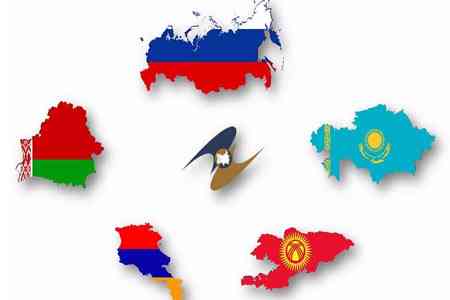


ArmInfo.It is necessary to develop the initiative to establish EAEU trading houses in Iran and in the territories of other promising partner countries.
Minister in charge of Trade of the Eurasian Economic Commission Andrey Slepnev stated speaking at a forum titled "Russia 2030 and the new world economic order: key factors and the role of business", held as part of the Russian Business Week 2024 at the Russian Union of Industrialists and Entrepreneurs, the press service of the Eurasian Economic Commission reports.
The minister reminded the event participants that as a result of the signing of a full-scale free trade agreement with Iran at the end of last year, exclusive conditions for access to the market of this country were achieved. "We have already doubled trade during the temporary agreement. We expect that after the permanent agreement comes into force, we will repeat this doubling in a short time. We hope to reach $12 billion within about three years and further increase our trade with Iran to about 18-20 billion compared to the current $6 billion," he said.
At the same time, according to Andrey Slepnev, only the trade agreement is not enough for the immediate growth of trade. In this regard, he highlighted the initiative on trading houses, which the Russian Union of Industrialists and Entrepreneurs has already launched several times. "We need to think together about how to properly structure this initiative. We are entering complex markets where non-standard approaches are needed," noted the EEC Minister of Trade.
In this regard, Andrey Slepnev informed that negotiations on free trade with Indonesia and the UAE are now active, and the EEC expects to reach final agreements with Egypt. In addition, the Commission hopes to intensify the Indian track, given the importance of this country for the North-South economic corridor. "I would also like to draw attention to Vietnam, with which our first free trade agreement was concluded. To be honest, we are not very pleased with how business responded to it: new companies are not entering the partner's market actively enough. But this is still the gateway to the region, and they treat us very well there, so I recommend that businesses take a closer look at this country," Andrey Slepnev addressed the entrepreneurs.
Separately, he focused on relations with China. On the one hand, the economic growth of the world's largest economy is slowing down, and on the other, trade and economic ties between China and the EAEU are growing sharply. The EEC is currently analyzing the relevant information and hopes to reach agreements with Chinese partners to balance trade flows.
"Within the framework of the existing non-preferential agreement with the PRC, we are becoming a little cramped: the scale of interaction goes beyond the framework that was laid down in 2015. Now we are conducting a practical discussion of the scenarios that scientists have developed in terms of prospects for deepening our trade and economic cooperation.
They are different: there is a scenario for finalizing the current agreement, there is a scenario that China has long proposed for a free trade zone (which we are unlikely to be ready for now), there is an intermediate scenario for limited preferential coverage, where there are certain prospects. Here we also count on close interaction with business," Andrey Slepnev summed up the Chinese topic.